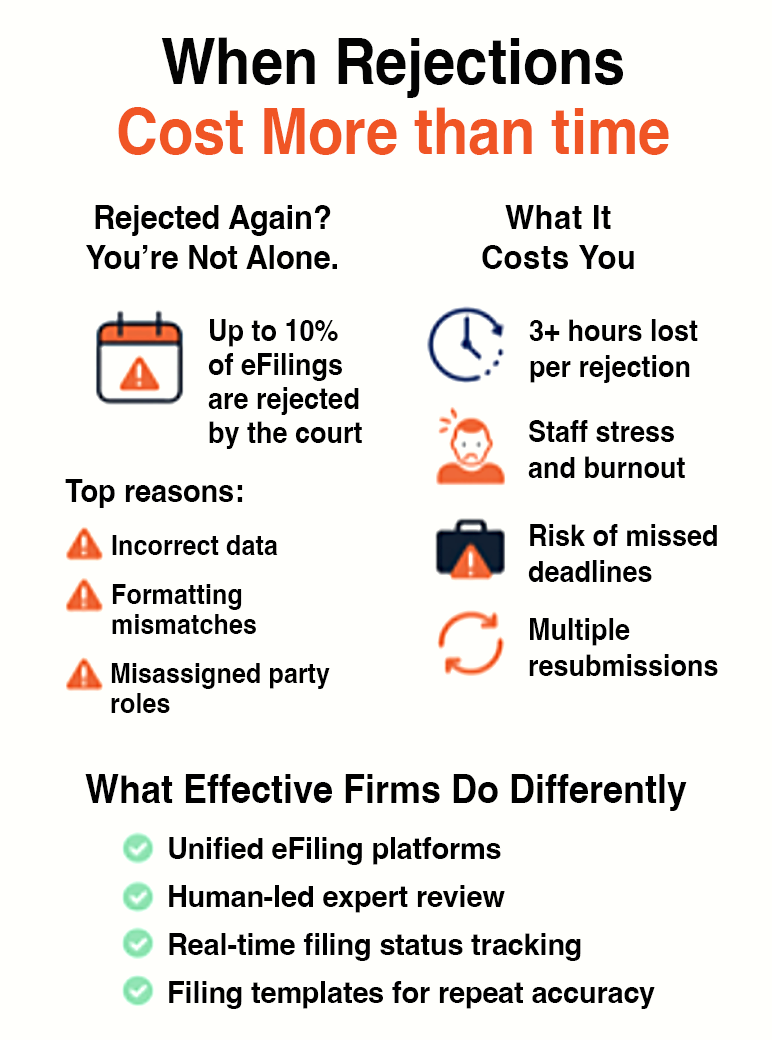If you’ve ever had an Illinois court bounce your court eFiling because of a wrong file type or missing detail, you know the pain. It’s not just a minor hiccup. A rejected eFiling eats staff time, stalls cases, and could even touch off a malpractice case.
As a legal professional, you know your work runs on speed and precision, and every delay has the potential to be a big deal.
Why, then, are eFiling rejections by Illinois courts still common?
Let’s look at what’s going wrong—and what the most effective legal teams are doing differently.

Why Illinois Court eFiling Trips Up Legal Professionals
Here’s the short list of what sends eFiled documents in Illinois off the rails:
Inconsistent formatting rules between counties
Cook County, for example, strictly enforces a single case number format (4-digit year, district number, 6-digit case number) and requires a Cook County Attorney Code.
Across the rest of Illinois, however, general case number formats are composed of a 4-digit year, 2-letter case category, and case number that may be 6 digits or 8 digits.
Something else to keep in mind when you’re eFiling legal documents in Illinois, DuPage and Cook County Attorney IDs are not the same.
In Cook County, a unique 5- or 6-digit attorney code is issued to an individual attorney or a law firm. In contrast, in DuPage County, individual attorneys use an attorney number assigned to the law firm.
Incorrect or missing information
This is one of the top culprits for rejected filings across Illinois. This includes failing to identify the correct party type, role, or case category when submitting documents electronically.
Even minor inconsistencies between case captions may be flagged by clerks and require full resubmission.
Improper lead document designation
Courts typically require one document to be flagged as the “lead”. Submitting multiple documents as “lead” can cause confusion in the clerk’s queue and result in rejections.
Find more information about how to handle lead documents and other case documents using Rapid Legal in this knowledge base article.
Too many eFiling platforms
Law firms that use multiple EFSPs multiply their own eFiling problems. Each provider’s platform provides a different user experience and staff are saddled with memorizing different logins and workflows.
This can boost the risk of human error and reduce consistency across the firm’s eFiling practices.
Limited visibility into post-submission errors or status changes
After submitting an Illinois court eFiling, the clerk has 24 to 48 business hours to review, which means you may not immediately know whether the eFiling was accepted.
You learn the fate of your filing after the court clerk reviews it and sends the registered user an email advising whether the eFiling was accepted or rejected.
Many firms may shrug off these issues as the cost of doing business. But that’s not true. What is true is a simple matter of building an eFiling process that works.

What Perfection Looks Like
How can you retool your error-prone court eFiling toward a more perfected process that won’t slow you down or compromise a case?
For the most effective law firms, the answer is to build a reliable, repeatable processe that delivers consistent results.
And, when those firms nail it, the difference is obvious:
- Acceptance rates can hit 98–99%.
- Confirmations come back fast.
- One login for all eFiling courts.
- Minimal resubmissions.
- Staff spend time on clients, not chasing rejection emails.
So now that you know where you’re going, let’s talk about how to get there.

Your Secret Weapon is Your EFSP
One of the biggest factors in your Illinois eFiling success is completely under your control: The electronic filing service provider (EFSP) you choose.
Pick the right one and your eFiling fails begin to fade from memory.
Here’s why.
1. Your work accuracy improves
Your EFSP’s platform can play an outsized role by providing automated alerts and guiderails that catch errors before you submit eFilings to the court.
Finding these errors prior to submission means your eFilings are cleaner and your acceptance rate will only go up.
2. Efficiency goes through the roof
Choosing a good EFSP means choosing one whose technology saves you time. Look for a provider that can integrate with practice management and document management systems like, Clio, NetDocuments, and iManage.
With these systems passing documents to each other directly, you don’t have to unnecessarily download, save, and upload documents manually. You’ve just eliminated hours of duplicate work.
Or, as your firm’s CPA would say, “Money saved.”
3. Human support when it matters
You know better than anyone that legal work is nuanced and complex. When you’ve got questions about an eFiling order in any of Illinois’ 102 counties, a canned response from a bot won’t always cut it.
The best solution may require a human operator who knows you, knows the courts, and can steer you through everything from how to properly compress a PDF to how to handle a missing document title.
4. Expert guidance and insight
The EFSP you choose should work with you as a trusted partner who has domain expertise with local court rules and process serving requirements. Having that knowledge close at hand will keep your Illinois eFiling moving forward and closer to chalking one up in the “win column”.
Likewise, your EFSP should bring your team data-driven insights about your law firm’s spend on eFiling and other litigation support services, performance, and results. Ideally, they’ll deliver these personally through quarterly business reviews.
Looking for a truly bankable advantage?
Get an EFSP that can sync its system with yours to cut hours off the time you spend on the task lying opposite of eFiling: matter reconciliation.
How many hours?
In some cases, the equivalent of one full-time employee.
5. Built-in backup
Downtime happens. So do power outages, cyberattacks, and force majeures.
Leading law firms know that perfecting their eFiling means having a backup EFSP with the integrations and automations mentioned earlier, in addition to being SOC 2 certified to protect sensitive client data.
eFiling in Illinois Shouldn’t Feel Like a Gamble
Whether you’re an attorney working under pressure, a paralegal juggling multiple cases, or a legal administrator trying to keep filings on track, one thing is clear:
Rejection is expensive. Perfection is scalable.
The good news? Achieving eFiling perfection is eaiser than it sounds.
See your goal
First, find out what perfection in eFiling looks like with this checklist.
Then, soak up every bit of eFiling efficiency you can from automated processes your EFSP provides that complement your eFiling.
Those efficiencies should include:
- Combined litigation support services.
- Automated proof after serve.
- Accounting integrations.
- Practice management system integrations.
Don’t overlook your EFSP’s knowledge base. It’s the fastest way to answer support questions about eFiling without spending crucial minutes waiting on hold.
Perfection is scalable
As your efiling acceptance rates climb you’ll reduce your law firm’s operating costs; making it the perfect time for growth.
If you’ve got plans to play on a bigger stage, find an EFSP certified to electronically file and serve documents in multiple states. This could quickly put you in huge markets like Texas and California with access to hundreds of new courts.
Best of all, if you’ve chosen the right EFSP, this strategic leverage comes at no extra charge.
Don’t stop at eFiling
Why not spread the advantages you get from perfecting your eFiling to other litigation support services you rely on, like service of process?
It’s a smart move, since nationwide process serving can unify two of your most-used service on a single platform that your team is already comfortable using. You can then move into services that help you operate efficiently such as file-and-serve, automated proof after serve, and more.

Ready to Move From Rejection to Perfection?
Illinois law firms that want to improve their eFiling success know they’ll need to do more than just “submit” and hope for the best.
They know they’ll need to partner with a litigation support service provider whose people and technology deliver consistent eFiling success they can count on.
Connect with a Rapid Legal account manager now and find out how to make rejections the exception.
